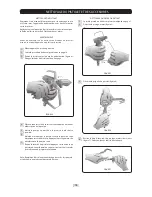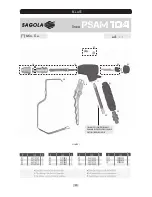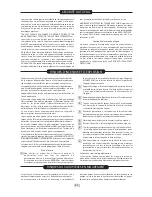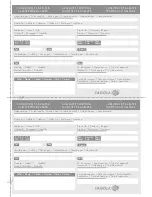
The product circulating at high pressure in the hoses is potentially
very dangerous. In the event of a leak or burst in the hose due to
wear of any kind, damage or improper use, the high pressure jet
issuing from the hose may cause the product to be injected or any
other severe body injury as well as damage to materials.
ALL PRODUCT HOSES MUST BE FITTED WITH PROTECTION SPRINGS
AT BOTH ENDS. Protection springs help to avoid the hoses from
becoming constricted or twisting near the join, which would cause
them to burst.
ADJUST as tightly as possible all connections through which
product will circulate. Products under high pressure can disengage
loose connections or allow the product to issue from the loose
connection under pressure.
NEVER
use a damaged hose. Before each use, check the entire
length
of the hose for leaks, scrapes, raised portions on the outer coating,
damage or loose connections. If any of these are detected, replace
the hose immediately. DO NOT attempt to use the high pressure
hose or repair it with adhesive tape or any other element.
HANDLE AND ARRANGE THE HOSES WITH CARE. Do not pull the
hose to move the equipment. Keep the hose away from moving
parts and surfaces of the pump and motor which may be hot. Do
not use products or solvents which are incompatible with the inner
finish or outer coating of the hose. DO NOT EXPOSE DELON hoses
to temperatures in excess of 82°C or below -40°C.
Electrical continuity of the hose
The maintenance of adequate electrical continuity in the hose is
essential to ensure the uninterrupted grounding of the spraying
system. Check the electrical resistance of your product hoses at
least once a week. Use a resistance gauge of suitable characteristics
for your hose for measuring the resistance. If the resistance should
exceed the recommended limits, replace it immediately. A hose
which is not grounded or is incorrectly fitted may cause the system
to be dangerous. See also RISK OF FIRE OR EXPLOSION.
RISK OF FIRE OR EXPLOSION
Application using a spray gun, washing, or cleaning equipment by
means of inflammable liquids in spaces containing a continuous
atmosphere may cause fire or explosions.
These tasks must be performed out of doors or in extremely
well-ventilated interiors. All equipment used must be grounded,
including hoses, containers and objects to be painted.
Avoid any potential source of ignition, such as the electrostatic
charge of a plastic awning, naked flames in pilot lights, heat points
(lighted cigarettes), electric arcs produced by connections or
disconnecting the power supply cables or switching the lights on
or off .
Failure to observe this warning may cause severe injuries and
possible loss of life.
The passage of product at high speeds through the pump and the
hoses may cause sparks. These sparks can set fire to the solvent
vapours and to the product being applied, to the powder particles
and other inflammable substances, whether application takes place
indoors or outdoors, and there is a risk of fire or explosion as well
as of serious injury and material damage.
If sparks are caused by static electricity or if the slightest discharge
is felt, STOP DISTRIBUTION IMMEDIATELY. Stop the system until the
problem has been identified and corrected.
In order to prevent the risk of static electricity, the equipment must
be grounded in accordance with the paragraph “Grounding”.
Grounding
To avoid risks deriving from static electricity, ground the spray gun
and all spraying equipment being used or which are in the spraying
area. CHECK the characteristics of the local electrical supply for
detailed grounding instructions, corresponding to the area and
the type of equipment used.
CHECK the grounding of all the spraying equipment.
Electrical equipment: plug to a correctly-grounded current
outlet. The extension cables must be of 3 wires and sized
correctly for the consumption of the equipment.
Pneumatic equipment: Ground correctly.
Product hoses: only hoses with an extension not exceeding
50m. may be used, in order to ensure continuity of the
grounding device. See Electrical Continuity of the Hose.
Spray gun: grounding is made through a connection to a
product hose or a correctly grounded spray gun.
Item to be painted. In accordance with the applicable
legislation in force.
Product container: In accordance with the applicable
legislation in force.
All containers of solvents used in spraying, in accordance
with the applicable legislation currently in force. Use only
containers which are metallic and electrical conductors. Do
not place these containers on non-conductor surfaces such
as paper or cardboard which interrupt the continuity of the
grounding of the element.
To maintain grounding continuity during cleaning or
decompression, always keep a metallic part of the spray
gun (hand protector) firmly pressed to the side of the
container which is placed on the floor, and then operate
the gun
Safety during spraying
Reduce the risk of product injection, static electricity sparks or
splashes, by following the spraying procedure described below.
RISK FROM MOVING PARTS
Moving parts are liable to injure or amputate fingers or other parts
of the body. Keep away from moving parts at start-up or when
using a pump. Before checking or servicing the pump, follow the
compression procedure given on page 2 to avoid accidentally
starting up the pump.
14
7
6
5
4
3
2
1
8
HOSE SAFETY










































